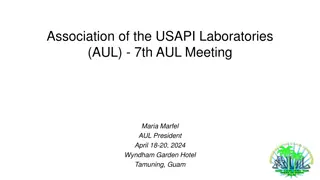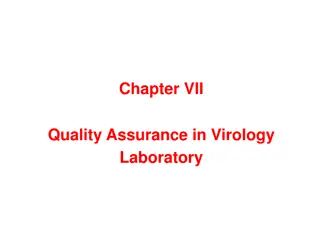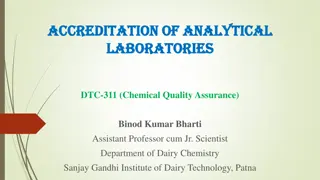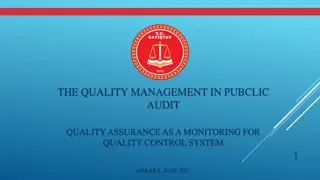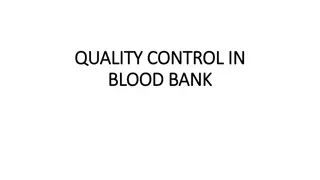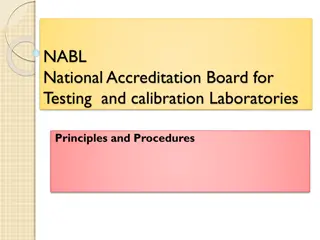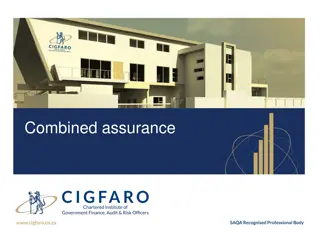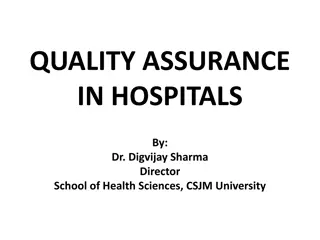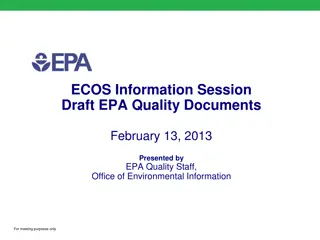Understanding Quality Assurance in Laboratories
Quality Assurance (QA) in laboratories involves internal quality control, external quality assessment, and quality improvement to ensure accurate and reliable results. It focuses on maintaining high levels of accuracy and proficiency to guarantee correct interpretations of test results.
Download Presentation

Please find below an Image/Link to download the presentation.
The content on the website is provided AS IS for your information and personal use only. It may not be sold, licensed, or shared on other websites without obtaining consent from the author. Download presentation by click this link. If you encounter any issues during the download, it is possible that the publisher has removed the file from their server.
E N D
Presentation Transcript
CBNAAT EQA KEY COMPONENTS, PLANS & ACTIVITIES
Contents Key components of CBNAAT Quality Assurance programme Contents of package to the sites Plans Activities and timelines Summary
Key components of CBNAAT Quality Assurance program Supplies - Uninterrupted supplies - Appropriate transport and storage conditions Specimens - Good quality - unique ID - Completed TRF Accurate and timely reporting - Turnaround time Results review Environmen t - Safe and functional - Temperature control Personnel - Trained and competent staff - Test user is documented - Current SOPs readily available External Quality Assessmen t (EQA) - Testing site s work checked by another site Internal quality monitoring - Test working properly Equipment - Maintained and serviced Accurate, reliable and timely results
What is Quality Assurance Quality assurance (QA) in laboratories incorporates all the factors that may influence the generation of reliable results. It comprises three key components. Internal quality control (IQC) External quality assessment (EQA) Quality improvement (QI) 4
Quality Assurance (QA) Encompasses a range of activities that enable laboratories to achieve & maintain high levels of accuracy & proficiency QA seeks to guarantee the right result from the right test at the right time on the right specimen from the right patient interpreted correctly 5
Components of Quality assurance Internal quality control (IQC) : It s a systematic internal monitoring of working practices, technical procedures, equipment and materials. External quality assessment (EQA): A process to assess laboratory performance. This component is necessary to ensure comparability of results among laboratories. Quality improvement (QI): Involves continued monitoring, identifying defects, followed by remedial action including retraining when needed, to prevent recurrence of problems. 9/15/2024 6
Why External Quality Assessment (EQA) EQA is also termed as proficiency testing and method to assess laboratory performance EQA strongly contributes to continuous quality improvement of laboratory Participating laboratories benefit because external quality assessment: serves as an early warning system, identifies systematic problems, provides objective evidence of laboratory quality, serves as an indicator for focusing improvement efforts, identifies training needs, provides a source for continuing education, provides a source of materials for practice performance 9/15/2024 7
Components of CBAAT EQA package to sites Processing SOP and Guidance documents EQA Result Format 5 Tubes of Panel and 5 pipettes 8
Plans Manufacturing and Panel Validation and verification Post EQA visits and report submission to CTD and states Collection of site contact information (address/phone) Feedback report to the sites CBNAAT EQA sensitization meeting Collection, Compilation and data analysis Packaging and shipment Testing panel 9/15/2024 9
Activities Activity Panel Manufacturing Validation and Verification of stability Packaging EQA Sensitization Meeting Panel Dispatch Result submission by the sites (within 2 days of receipt of samples) Result EQA Feedback to sites 31st of May 2020 Post EQA Visits Final report preparation and submission to CTD and States 9/15/2024 Timelines January 2020 March 2020 April 2020 2nd February 2020 3rd wk of April 2020 2nd wk of May 2020 (Due Date) June -July 2020 April- July 2020 10
Summary Quality assurance is integral and key component of lab activities and is not additional activity All quality assurance activities must be documented Feedback to testing sites and implementing corrective and preventive measures are the most critical aspects of any quality assurance programme Quality assurance is needed whether GeneXpert is placed in a TB C&DST Lab setting or in DMC setting or in a mobile van. 9/15/2024 11
Thank You! 12







